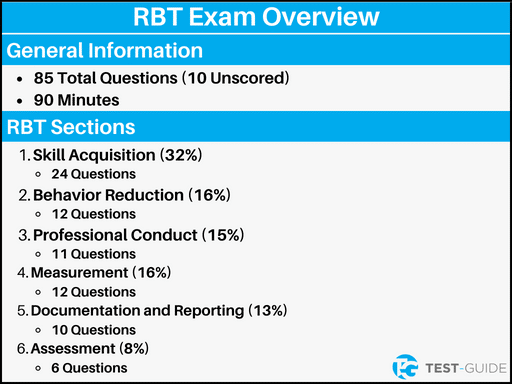All RBT Practice Exams
Take a RBT practice test below to get a better idea of what will be on the actual test. Make sure to review the answer explanations at the end of each exam.
Overview of the RBT Exam
RBT stands for Registered Behavior Technician and is a credential administered by the Behavior Analyst Certification Board (BACB). A comprehensive test is given as the final step to becoming a RBT.
The RBT test is the foundational step to many career paths in the behavioral analysis field. It follows a 40-hour training program where you will be evaluated by a certified therapist in order to qualify for this test.
Fast Facts:
- Number of Questions: 85 (10 are Unscored)
- Time Limit: 90 Minutes
- Question Format: Multiple-Choice
Sections on the RBT Exam
There are 6 main content areas tested on the RBT exam:
- Skill Acquisition (24 Questions, 32%): Individuals must be able to identify the essential components associated with creation and implementation of a skill acquisition plan. This plan includes various teaching processes that work for a client.
- Behavior Reduction (12 Questions, 16%): Individuals must be able to understand the context of common behavioral functions and use that information to implement interventions.
- Professional Conduct (11 Questions, 15%): This section includes questions that showcase your ability to protect the dignity of clients, properly communicate with a client’s legal caregivers, and respond to feedback professionally. This includes understanding the regulations involved with sharing this information.
- Measurement (12 Questions, 16%): This section includes collecting data from a number of sessions and then entering that data, updating charts, and describing behaviors based on that information.
- Documentation and Reporting (10 Questions, 13%): This section includes questions that test your understanding of communicating with supervisors and seeking clinical direction while also complying with legal, ethical, and other regulations.
- Assessment (6 Questions, 8%): This section includes questions based around the skills associated with conducting preferences assessments.
Here is the RBT handbook for additional information.

Scoring of the RBT Exam
The BACB established their own passing score using a modified Angoff method. This means that a board determines the passing score.
The RBT test is scored using a scaling system with a rating from 0 to 250. In order to pass this exam, you must score at least 200 on this scale (80%).
Remember, only 75 of the 85 questions are scored on the exam. So, you will want to try to answer 60 or more questions correctly.
In 2023, 74% of candidates passed the RBT exam their first time (source).
Registering for the RBT Exam and Test Dates
Before you can take the exam, you must meet these requirements:
- 18 Years or Older
- High School Level Education or Higher
- Background Check
- Complete 40 hours of Training (More Info)
- Complete an Initial Competency Assessment (More Info)
Pearson Vue is in charge of delivering the RBT exam. You will be taking the exam in-person at a Pearson Vue testing center.
You can schedule your exam by going to your Pearson Vue account.
You will be charged $45 to take the exam. If you wish to retake the exam, you must wait 7 days.
Studying for the RBT Exam
One of your main focuses is to understand the RBT task list. You’ll get 40 hours of in-person experience to qualify for the RBT test so this will help you understand the context of this task list, but you’ll still need to memorize the information.
Your first step is to lay out a detailed study plan and allocate time to each of the topics listed in the previous section. We will lay them out again for your convenience:
- Skill Acquisition (32%)
- Behavior Reduction (16%)
- Professional Conduct (15%)
- Measurement (16%)
- Documentation and Reporting (13%)
- Assessment (8%)
RBT exam practice will give you a good indication of which area needs the most study focus. For instance, if you score high on the “Professional Conduct” section but score low on the “Assessment” section, then you know that you need to dedicate more time to studying “Assessment.”
With that said, areas that are weighed more heavily must also be a priority. For example, since “Skill Acquisition” accounts for 32% of your overall score, this area will be given more study time.
Here are some additional tips to make the most of your study time.
- Make your study sessions a priority. Dedicate time to yourself and let everyone know not to interrupt you.
- Have all study material prepared ahead of time so that you don’t waste precious study time searching for resources.
- Take a regular RBT practice test and adjust your study plan according to its results.
Mitigating the Stress of Testing
- Maintain a consistent study schedule. Allow enough time to study what’s needed but not so much time that it leads to burn out. Also don’t ever try to cram for the exam. Spread up studies evenly over the course of your prep time.
- Simulate the real testing environment as closely as possible when taking a practice exam. Set a time limit and mimic the physical environment. This prepares you for the real test.
Frequently Asked Questions
How Long Does it Take to Study for the RBT Exam?
In reality, your studies should begin the moment you start your 40-hour training program. This is not only a requirement for taking the RBT test, it’s a great chance to gain a lot of valuable experience.
With that said, you should allow one to two months of preparation before taking the RBT test. This time period includes your 40 hours of live training too. That will give you approximately a week to dedicate to each topic and also provides you with a few days of downtime before the exam.
Is the RBT test hard?
It’s considered a difficult exam, sure. But you’ll have amassed 40 hours of live training to even qualify to take this exam. Taking notes and asking questions during this training period significantly lessens the difficulty of the RBT test.
Adding additional focused study and regular practice tests removes most of the anxiety associated with this important test. Thus, you’ll mitigate its difficulty even further.
What happens if I fail the RBT test?
You get 8 attempts at passing the RBT test over the period of one year. So to answer the question, you can retake it. But each attempt requires additional retake fees so you should try and pass on the first attempt.
If the worst happens and you do need to retake the test, just wait 7 days and then find the retake application on your BACB account.
Is the RBT test multiple-choice?
Yes. The RBT test is comprised of 85 multiple-choice questions. Only 75 of them count toward scoring though since 10 are trial questions used to creating newer tests. Each question only has one correct answer.
How many questions do you have to get right on the RBT test?
The RBT test is scored using a scaling system with a rating from 0 to 250. In order to pass this exam, you must score at least 200 on this scale.
Since 75 of the 85 questions are counted toward this score, that means you must answer 60 questions correctly in order to pass. The trial questions do not count against this score. However, you won’t know which ones are trial questions since they are not marked.

